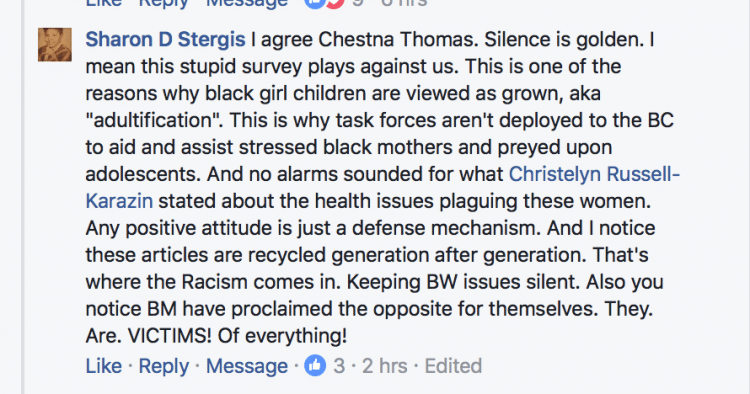It started in the 80’s, when a curious study emerged that black women reported higher body confidence and higher self esteem, despite herculean challenges and statistics. The white people marveled at how black women could be so much “stronger” despite suffering high rates of domestic violence, rape, murder, discrimination, colorism, obesity, low marriage rates, high out-of-wedlock rates, and high divorce rates. How is it that these black women can feel so good about themselves? Surely they must be a different kind of woman. One that can take a punch.
I imagine that back then and now today, with “50 States of Women” survey, that black women picked up the phone, opened the door, or emailed the white surveyors with collective arched eyebrows, and was damn well not going to air the dirty laundry. They weren’t going to tell these outsiders how stressed they were, how exhausted, how scared, how angry. “Everything is fine. I’m blessed. Nothing to see here. Goodbye.”
One comment from a reader crystallized this when I posted the first article I wrote about this:

While at the surface, these reports elicit a lot of #blackgirlsrock-ism, there’s an even more damaging effect to these “othering” reports.
Related Video
https://youtu.be/E8EuZuHhRMs
I don’t think that organizations like Glamour magazine mean any harm. I think much it is unconscious, and outsiders have the benefit of the distant observer. But we know the real story, and how this type of propaganda harms us in the long run.
Two years ago a study published in the Atlanta Black Star said that black women, feeling pressure to always be strong, are ignoring their own mental wellness. This point was of particular note:
Researchers talked to more than 1,400 Black women and roughly 340 white women.
With such a significantly greater amount of Black participants, one might be quick to think that the Black women reporting struggles with depression would outnumber their white counterparts.
Even with more than 1,000 extra Black female participants, the national survey found that only 10 percent of Black women reported dealing with depression or any other mental health disorder at some point in their lives.
More than 20 percent of white women said they dealt with at least one mental health disorder.
When specifically focusing on depression, Black women still represented a miniscule part of the population that admitted to dealing with the disorder.
While nearly 10 percent of the white participants admitted to battling depression within the last year, 5.5 percent of Black women reported the same.
Another 22 percent of white women admitted to dealing with any kind of mood disorder at some point in their life. Only 14 percent of Black women reported so.
So does this mean Black women are happier, more carefree individuals? Is this an implication that these women are just as strong as society has always proclaimed them to be and that despite facing life changing obstacles and unique challenges, they are nearly invincible when it comes to emotional distress?
Not at all.
You know what this study proves? That white women are a lot more comfortable being vulnerable. That vulnerability translates to femininity. Our invulnerability translates into something that has not served us well.
Powerful media companies like Glamour would serve black girls and women better if they would pull back the curtain and really SEE what’s going on, and go in-depth to help us experience the paradox of being empowered while simultaneously reaching out for help.
Somebody give them my number.
Follow Christelyn on Instagram and Twitter, and subscribe to our You Tube channel. And if you want to be a little more about this online dating thing, InterracialDatingCentral is the official dating site for this blog.